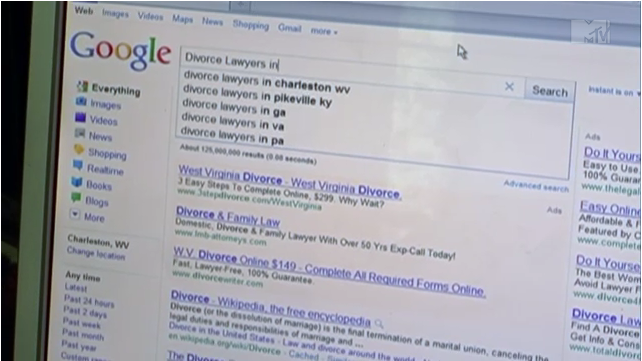Disclaimer: I don’t regularly watch Teen Mom or MTV.
However, it was recently brought to my attention that one of MTV’s teen moms began her search for a divorce lawyer using the internet. So, of course I had to take a look.
And after wading through unfortunate scene after unfortunate scene, at about the forty-sixth and a half minute, we finally reach Leah’s search for a divorce lawyer (46:30):

My intention with this post is neither to discuss teen pregnancy nor whether or people should use the internet or search engines as part of their quest to find a lawyer. The truth is, for both better and worse, people are using search engines and the internet to find, research, and learn about lawyers.
Instead, I’d like to take a moment to analyze how Leah uses Google to begin her lawyer search, and how Google returns results.
Her Search
First, it’s worth noting that Leah begins her search by typing:
Divorce Lawyers in
As you can see, Google Suggest begins showing a variety of suggested results, the top being:
Divorce Lawyers in charleston wv
Which makes sense because Leah’s browser location is set for Charleston, WV. From the episode, it appears that Leah ignores the suggested items, and continues to type in Charleston. However, the film crew cuts to a shot of Leah’s daughter, so unfortunately, we don’t get a chance to see how Leah actually completes her search and clicks through to the attorney’s website.
However, we do see that she eventually ends up at http://www.lyneranson.net/.
And if you set your browser location to Charleston, WV and search “Divorce Lawyers in charleston wv”, Lyne Ranson’s site is listed #1 in Google’s organic rankings.
And after what appears to be a cursory review of Lyne Ranson’s site, Leah gives the attorney a call and requests a consultation.
The Search Results
In this example, Google served up paid search listings and traditional organic results (as opposed to local results).
While it doesn’t appear from the video that Leah clicked on the suggested results, it is worth noting what listings Google suggested.
In my experience, paying attention to Google’s suggested results can provide valuable feedback in discovering keywords to use on your site.
Further, it appears that Leah quickly skipped past the paid search results and clicked on the first organic result on the page.
This is a pretty straightforward example of how some people use search engines more like traditional business directories.
Lyne Ranson’s Site
For the purposes of this post, I’m not going to dive into my thoughts on the design or content of the attorney’s website. However, I do want to point out a couple on-page optimization points.
First, the title of the home page is:
<title>Family Law Attorneys Charleston | West Virginia Divorce Lawyers Huntington, Parkersburg, Beckley</title>
In this example, the website includes practice area and geographic keywords. Keywords in the title of your web pages are one of the strongest on-page factors that search engines use to understand what your pages are about.
Next, we get some meta keywords:
<meta name=”keywords” content=”family law, divorce lawyers, lawyer, attorney, family law, Charleston, West Virginia, Kanawha County, Putnam County, Cabell County, Wood County, Raleigh County, Lincoln County, Boone County, Logan County, Clay County, Fayette County, Jackson County, Huntington, Parkersburg, Beckley, Logan, Princeton, Madison, Winfield, Hurricane, Ripley, Ravenswood, Oak Hill, Fayetteville.”>
This site includes several meta keywords. Using meta keywords for optimization is really a relic of an early time in search. It is largely agreed that these meta keywords are no longer used by search engines as a ranking factor.
Then we get the meta description:
<meta name=”description” content=”Contact family law attorney at Lyne Ranson Law Offices, PLLC is in Charleston, West Virginia. We provide exceptional and effective family legal services. Call (304)-344-2121 today to speak with our experienced family law attorneys.”>
The meta description, which is really as close as a webmaster can get to an “ad” in an organic search results, again describes the practice, but also provides contact information.
While I wouldn’t say this is the best example of on-page optimization that I’ve seen, it is far from the worst.
Often times, lawyers’ websites fail to use any descriptive keywords in title tags other than the firm’s name. Further, some websites don’t include meta descriptions at all. Fortunately, with some minor adjustments, content management systems like wordpress will help you easily avoid the most common technical optimization mistakes.
I would give both the title and description a B.
It’s tough to be too critical considering that, at least in this example, the site came up number one organically and actually generated a potential client inquiry.
One more thing to be conscious of when crafting page titles and description are your state’s ethics rules. Be careful not to use adjectives that might be objectionable under the rules. Generally speaking, this means not using words that are either blatantly false, or might be misleading.
If you’d like to see the actual video, I have provided it below. Unless you’re a Teen Mom fan, or are interested in finding out whether you might be one, I recommend skipping forward to around 48 minutes and 30 seconds. You’ll probably have to site through a minute of ads before you can view Leah’s search.